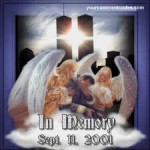Twenty-fourth Sunday in Ordinary Time – Cycle A
September 11, 2011
Reflecting on Sirach 27:30-28:7
Psalm 103:1-2, 3-4, 9-10, 11-12
Let me add my astonished voice to the millions of voices who must have said today, after hearing today’s Gospel, “Of all the days in history for these readings to come around! God is clearly in our midst.”
Think about it. Forty-two years of Sunday Masses have gone by since the new lectionary was received by the Church on the First Sunday of Advent, 1969. That’s 2,184 Sundays. Jesus’ great parable about the necessity of forgiveness has only appeared on fourteen of those Sundays, and one of those is today, on the tenth anniversary of the event which challenged our willingness to even speak of forgiveness, much less try to activate it.
September 11, 2001 is the date that will live in infamy for most Americans because more of us living today were of age on that date than were of age on December 7, 1941, and the generation who lived through that awful day in 1941 was equally shocked when those towers came down.
On this tenth anniversary of the temporary triumph of hate, let the memories come. Let the shock set in again, and the sadness. And then turns your eyes upon Jesus, and who speaks so intimately to the world today through Matthew’s Gospel account, and whose kindness is new every morning.
And hear old Sirach, reaching out to us in time today: Wrath and anger are hateful things, yet the sinner hugs them tight…The vengeful will suffer the LORD’s vengeance, for he remembers their sins in detail.
Who will speak the wisdom of Jesus, the Reconciler, in our age? If not us, who? If not now, when? Let’s let our voices ring. Let’s seek the way of peace together. Let’s roll.
How has the event of September 11, 2001 impacted your relationship with God?
What would YOU like to say about this question, or today’s readings, or any of the columns from the past year? The sacred conversations are setting a Pentecost fire! Register here today and join the conversation.
I have come to light a fire on the earth; how I wish it were already burning (Lk.12:49).


9/11/01 Put something in my heart that took a long time to come to terms with, “fear”. But I”m a chatter every where I go I chat with people. One day in along line at the Post Office there was a Muslim woman and her young daughter. she spoke well for her people and faith. There was no anger or hate in her voice. She told about the hunger in her country and the fear they live in daily. And how extreme proverty brings on extreme measures in people, right or wrong people want tp make a change and sometimes follow leaders along the wrong paths. She asked who did I follow? Who would I vote for and when I looked for spiritual direction where did my faith lay? I was dumn struck, I wasn’t back in the Catholic faith yet and my political veiws were not certain. I was numbly walking through life. So that little voice that had already been calling me back to the Catholic Church softed me up a little more. Some of my fear eased that day and I started follow Jesus a little more. What can I say I”m a work in progress!
Who will speak the wisdom of Jesus, the Reconciler, in our age? I did that last October when I gave a mission to one of the parishes in Virginia, a small town surrounded by at least 6 institutions of higher learning. I explicitly brought up the 911 event and how 300 Muslim scholars dis-avowed the extremism of the terrorists. Results? I lost quite a few for my next session. Some found it a hard saying. Was it worth it? Of course. The ego of the speaker must always bow down before the Gospel. – – Cris
He who cannot forgive breaks the bridge over which he himself must pass.
– George Herbert
I received this quote on a daily inspirational feed I get…the day AFTER that gospel. I have been examining my life, trying to decide how this same message, on two successive days, needs to speak to me. I feel I can forgive, but not necessarily trust the forgiven. So then, have I really forgiven? I am really struggling with that question, and an answer!
Dear clm1127,
Don’t confuse “forgive” and “forget.” They are not the same and shouldn’t be linked. You can forgive without putting yourself in harm’s way in the future with the person who hurt you. When we forgive, we let go of the wrong that was done — we are not obsessed with it — it is for ourselves that we forgive. We must also be self-protective to avoid future pain.
People earn trust. When they have violated our trust, they must earn it back, and it’s more difficult each time they hurt us. That should not stand in the way of forgiving, however.
Brebis, thank you! That differentiation between “forgive” and “forget” helps!